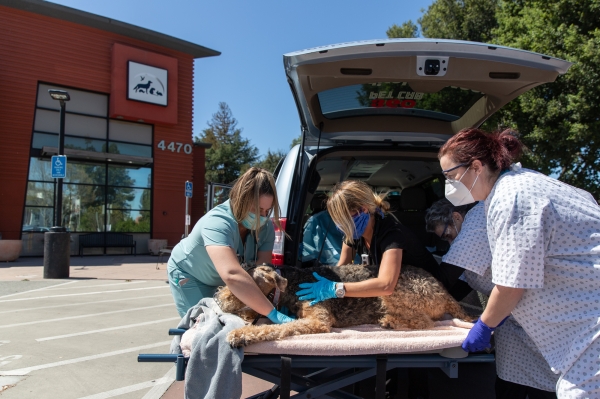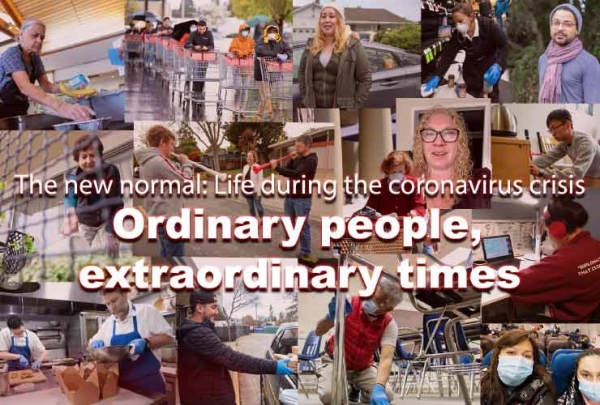Jeanne Salem can tell you just about every way to bathe a cat, even those that may be feeling a bit grumpy. It's knowledge she recently learned to help reduce the potential spread of COVID-19 while transporting pets to and from veterinary clinics throughout the Bay Area in her specially outfitted pet cabs.
Salem, who launched her pet transport company, 360 Pet Cab, in early 2019, has partnered with a handful of local animal hospitals to help people whose pets need vaccines and urgent medical care while the stay-at-home order remains in effect. It's a rare, no-contact transportation service that brings her to the Midpeninsula several days a week.
"The calls I'm getting are from pet owners who are isolated at home with pre-existing conditions that make them more vulnerable to COVID-19," said Salem, who pivoted from a career in the corporate world to the pet transportation industry after her own cat was diagnosed with lymphoma and required multiple trips to the vet. "Prior to the shelter-in-place orders, many of our customers were working with us to shuttle their pets to and from the vet for non-emergency care. Now, it's mostly all emergency care."
Over the past couple of weeks, Salem has ferried an assortment of pets, including a 10-pound pup whose owner recently underwent heart surgery and is unable to leave the house for any reason.
Salem said each animal delivery requires a lengthy list of precautionary measures that begin before any of the company's six employees even pick up a pet at a client's home.
"The precautions we're taking are similar to the same protocols as paramedics," said Salem, whose lead medical assistant, a paramedic, designed the pet cab interiors with features like portable stairs and secured oxygen tanks and developed safety protocols using best practices from human emergency-medical-transport standards.
During the coronavirus crisis, the company has been looking to the American Veterinary Medical Association and the U.S. Centers for Disease Control and Prevention to stay updated on proper safety measures.
"We treat every case as if the dog or cat has COVID viral exposure on its fur," she said.
Before she and her vet tech board the cabs, they are required to put on gloves, a mask, safety glasses and gowns — a process she calls "garbing up."
The back of the van is prepped with a disposable and waterproof tarp on which the pet carrier is placed.
Pet owners also are sent a list of safety guidelines that must be followed, including bathing their pet prior to pickup using a variety of methods recommended by Salem's 360 Pet Cab.
"This can be the tough part. Some cats can tolerate baths, but some cats can't," Salem explained. "We give them a protocol on how to wipe them down with some soap and then remove it later."
If the pet is in complete distress, and it's an emergency, Salem makes an exception to that particular guideline.
When the shuttle arrives for pickup, the animal must be in a crate outside the house so that the Pet Cab driver and accompanying vet tech don't have any contact with the owner, Salem said.
"We want to make sure that everybody's protected," she said. "We don't want the virus to transfer to us or be on a surface in our van that spreads to the vet, so we're always working with that."
After each transport, Pet Cab brings the vans back to the dispatch center in San Jose for a deep-cleaning that starts in the interior with alcohol wipes, followed by vacuuming, followed by a hot-water-and-bleach cleanse and ventilation. Each two-person shuttle team discards their soiled gowns in a bag, and when the next call comes in, the process starts all over again.
Salem said the extensive, and sometimes exhausting, cleaning routine hasn't been the biggest change in her business over the past few weeks.
She said the need for the delivery of prescription pet food, flea medication and other medicines has skyrocketed. Most of her business is now centered around deliveries. Salem said she makes at least three trips a week to pick up prescription items in the Palo Alto area.
"There's a lot of people who are isolated at home and they want (pet) prescription deliveries, which I never had requests for until now," she said. " I'm just like DoorDash. I literally drop off items at the door and leave."
Salem said prescription items are sometimes difficult to order online from sites like Amazon or Chewy. Because she has a partnership with Adobe Animal Hospital in Los Altos and Sage Veterinary Centers in Redwood City, she can pick up prescriptions for clients of those clinics and deliver the items the same day.
"Since COVID hit, a lot of people don't want to leave their house. They're scared," said Salem, who also is concerned about possibly being exposed to the virus. Salem said she finds herself concentrating on things that she typically wouldn't give much thought to, like not touching her face or taking off her shoes before she goes into her home.
Despite the unexpected adjustments, Salem said she believes her business will come out of this crisis stronger. She's already working on a business plan to provide virtual check-ins with clients and plans to continue making prescription pickups.
"One of the things we're giving them is peace of mind."
-----
This profile originally appeared in the April 17 print edition of the Weekly and is part of our ongoing series, "Ordinary people, extraordinary times," capturing the stories of locals during the coronavirus crisis. Read more of their stories through the links below:
Week 4:
Week 3:
• Not even catching polio in the 1940s compares to COVID-19 pandemic, local woman says
Week 2:
Week 1:
• Back from Wuhan, Palo Alto woman faces quarantine — again
• Working without protective gear, health care worker on edge over mysterious coronavirus
• Stanford's swift actions against COVID-19 leave some students at a crossroads
• Coronavirus brings down curtain on debut for Pear Theatre's new artistic director
• Making deliveries during the COVID-19 pandemic has incentives — and a dark side
-----
Find comprehensive coverage on the Midpeninsula's response to the new coronavirus by Palo Alto Online, the Mountain View Voice and the Almanac here.




Comments
Cuernavaca
on May 7, 2020 at 9:35 am
on May 7, 2020 at 9:35 am
pet transport company
Nice reprint of their press release.